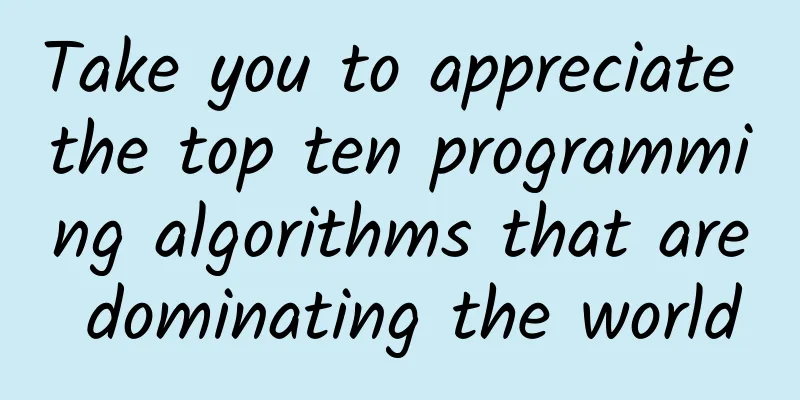Take you to appreciate the top ten programming algorithms that are dominating the world

|
It’s hard to overstate how important algorithms are to our lives today. They’re everywhere in the virtual world, from financial institutions to dating sites. But some algorithms change and control our world more than others—here are ten of the most important. Before we get into algorithms, let's quickly review some basics. Although there is no clear definition, computer scientists describe algorithms as a set of rules that define the order of operations. They are a set of sequential instructions that tell a computer how to solve a problem or achieve a certain goal. A good way to understand algorithms is to visualize them as flow charts. 1. Google SearchNot long ago, search engines became the dominant force in the Internet era. Along with the rise of search engines, Google and the PageRank algorithm proposed by Google also rose.
Today, Google has a 66.7% market share in the core search market in the U.S., followed by Microsoft (18.1%), Yahoo (11.2%), Ask (2.6%), and AOL (1.4%). There is no doubt that Google has dominated the search market, and many of us use Google as our primary way to use the Internet. PageRank works by relying on two components, one is an automated program called a "spiders" or "crawlers", and the other is an index of keywords and their positions. The algorithm calculates the importance of a web page by calculating the number and quality of links to it. The basic idea is that the more important a web page is, the more links it will have. It's a basic popularity contest. In addition, the PageRank algorithm also takes into account the frequency and position of keywords in a web page, as well as the time when the page was published. 2. Facebook News FeedAs much as we hate to admit it, Facebook’s News Feed is our favorite place to waste time. Unless your preferences are set to show all events and update all your friends’ news in chronological order, the news you see is a pre-processed selection of news tailored for you by Facebook’s algorithm. To decide which news stories are the most interesting, the algorithm takes into account many factors, such as the number of comments, who posted it (yes, there is a ranking of "popular" people for a piece of content, and the so-called "popular" people are the people you interact with the most), and the type of post (such as photos, videos, statuses, updates, etc.). 3. OKCupid Couple MatchingOnline dating is now a $2 billion industry. Thanks to sites like Match.com, eHarmony, and OKCupid, it has expanded 3.5% annually since 2008. Analysts expect the industry's growth to continue accelerating over the next five years—and for good reason: It's an efficient way for couples to meet. Not only do dating sites lead to more successful marriages, they also excel at matching potential couples based on their preferences and tendencies. Of course, these matches are made entirely by algorithms. We'll take OKCupid, a free dating site co-founded by Harvard mathematician Christian Rudder. OKCupid takes a decidedly analytical approach to dating, and they do their best to get information from their users. The matching algorithm on OKCupid goes beyond simply matching people with common interests, and each question is given a weight to measure how important it is to the user and their potential partner. This is what's called difference-making - one of the reasons why OKCupid is the most effective dating site. 4. NSA Data Collection, Decoding and EncryptionWe are increasingly being watched by algorithms rather than by people. Thanks to Edward Snowden, we know that the NSA and its allies have been secretly monitoring millions of innocent citizens. Recently disclosed documents show that many of these surveillance programs have been carried out by FiveEyes, an intelligence organization jointly formed by the United States, Australia, Canada, New Zealand and the United Kingdom. They have monitored our mobile phones, emails, webcam images and geolocation information. And by "they" I mean their algorithms, which contain too much data for human beings to collect and interpret. Interestingly, the NSA claims that they don't actually "collect" our data. According to a 1982 procedures manual, "information is 'collected' when it is collected and used by the Department of Defense Intelligence Agency in the course of its duties." And "data is collected by electronic systems when the information is collected and converted into an intelligible form." Bruce Schneier of the Guardian explains: "So, let's say your friend has thousands of books at home. According to the NSA, he doesn't 'collect' books. He only 'collects' the books he actually reads. He doesn't 'collect' books when he uses them for other things." This creates a problem because: Computer algorithms are closely related to people. When we think of computer algorithms monitoring us and analyzing our personal data, we have to think about the people behind the algorithms. Is there someone looking at our data? In fact, what they can do is surveillance. Most relevant is the NSA's Suite B cryptographic algorithm, a powerful set of algorithms for encryption, data exchange, digital signatures, and hashing that the agency uses to protect classified and unclassified documents. 5. Recommendation AlgorithmSites like Amazon and Netflix keep track of the books you’ve bought or the movies you’ve watched, and then recommend products to us based on our preferences. Like many automated programs, this 21st-century technology has both advantages and disadvantages. While the recommendations can be helpful, they can also be off-target—especially if you're shopping for a children's book as a gift for your three-year-old daughter. As with PageRank and Facebook’s News Feed, such algorithms are creating what is known as a “filter bubble,” a phenomenon where users are isolated from information they are not interested in — effectively isolating users in ideological “bubbles.” This leads to what Eli Pariser calls “information determinism,” where our past online interests determine our future. 6. Google AdWordsSimilar to previous algorithms, Google, Facebook, and other sites track your behavior, words, and search requests to push relevant ads. Google's AdWords - the company's main source of revenue - is predicted in this way, and Facebook is also doing its best to study it (when was the last time you clicked on a Facebook ad?) 7. High frequency stock tradingThe financial sector has long used algorithms to predict market fluctuations, but their use in high-frequency stock trading is only just beginning. Such high-speed trading involves algorithms, also known as robots, that can make decisions on orders in milliseconds. In contrast, a human usually needs at least a second to react to potential risks. As a result, people are gradually being excluded from the actual trading loop - a whole new electronic ecosystem is gradually taking shape. However, it is these algorithms that make mistakes. Leo Hickman explains: For example, the “flash crash” of May 6, 2010, when the Dow Jones Industrial Average fell an average of 1,000 points in a few minutes, and the market rebounded 20 minutes later. Such a sharp drop has not yet been fully explained, but most economists blame it on “race to the bottom”. The culprit of the “race to the bottom” is the large-scale use of quantitative trading algorithms to achieve high-frequency trading. Scott Patterson, a reporter for the Wall Street Journal and author of “The Quants”, compares the use of these algorithms on the trading floor to the autopilot of an airplane. Today, most trading is done automatically by algorithms, but when the situation is different, such as in a flash crash, human intervention should be required. 8. MP3 CompressionCompressed data algorithms are an integral part of the electronic world. We want to receive media data faster while saving hard drive space. Therefore, many methods have been devised to compress and transmit data. For example, in 1991, Cisco Systems developed the CRTP protocol. In 1987, German researchers invented the MP3 format that is widely used today, which reduces the size of audio to one-tenth of its original size. This compression format has revolutionized the music industry (for better or worse). 9. Predictive analytics softwareIt’s not taking over our world yet, but it will be soon. More and more police agencies are using a new tool called predictive analytics — a technique reminiscent of the movie “Minority Report.” In 2010, it was said that by using IBM's predictive analysis software (called CRUSH, the full name of Criminal Reduction Utilizing Statistical History), the Memphis Police Department has reduced more than 30% of serious crimes since 2006, including a 15% reduction in violent crimes. At the same time, cities in Poland, Israel and the United Kingdom are also paying attention to this technology. Now, Los Angeles, Santa Cruz, Charleston and other cities have also started pilot projects.
This technology combines data collection, statistical analysis, and of course, cutting-edge algorithms. It allows police to assess the characteristics of crime in the city and predict possible crime "hot spots" so that they can "proactively allocate resources and manpower to improve the efficiency of human and material resources and enhance public safety." In the future, this system could replace analysts’ work on a large scale. Criminal behavior could be tracked by sophisticated algorithms that monitor Internet behavior, GPS, personal electronic devices, biometrics, and other real-world communications. Drones will increasingly be used to track potential criminals, analyzing their body movements and other visual clues to predict their intentions. 10. Auto-Tune***, just for fun, nowadays tuners are done by algorithms. Whether it's a voice or an instrument, these devices can slightly modify the pitch to the nearest accurate semitone using a set of specific rules. Interestingly, this technology was originally used by Exxon's Any Hildebrand to process seismic data. "Believe" by American singer Cher is considered the first pop song to use tuning. |
<<: 12 ultimate technical conjectures about the world of programming
Recommend
Detailed experience of the latest version of WeChat: tap and feel comfortable
WeChat 7.0.18 is here. This update brings a featu...
What should I do if my short videos don’t increase my followers? How to attract fans through short videos?
Many short video creators have been complaining t...
What regulations should be followed when adding keywords to Baidu search promotion?
What are the specifications for adding keywords? ...
What is the difference between Baidu Promotion Assistant's quick search and advanced search?
For novice friends who have just entered the indu...
With 470,000 followers on Weibo and 30,000+ followers on each article on his official account, how did NetEase create the internet celebrity Wang Sansan?
Do you still remember the “ Sangcha ” that was al...
Douyin super useful information: a complete guide from getting started to operation!
"Two Weibo and One Douyin" have become ...
Sun Jing Victoria's Secret Body Sculpting 14-day Family Training Camp Waist and Abdomen Shaping
Sun Jing Victoria's Secret Body Sculpting 14-...
Why don’t you know how to promote your products?
Founders often underestimate the importance of hir...
With the lead rate declining, how can the franchise industry save itself after the epidemic?
During the epidemic, some people waited while oth...
Liu Rongjun, "3M: How to build an innovative enterprise"
Liu Rongjun's "3M: How to Build an Innov...
Operational Tips: How can a good product retain users?
Many bosses are very tired doing business. Why? A...
After 6 years, the first perfect jailbreak of iOS 14 is released: supports iPhone 12
[[431010]] Since the perfect jailbreak in the iOS...
Top 50 Private Domain Tricks of Brands
If 2020 is the first year of private domain, 2021...
Huawei's self-developed operating system Project Z, which replaces Android, is exposed
On May 22, Huawei's consumer business CEO Yu ...
WeChat Reading Product Analysis Report
" WeChat Reading " is a reading softwar...









